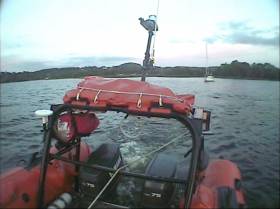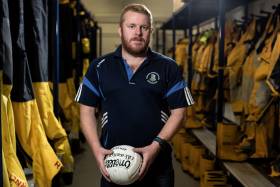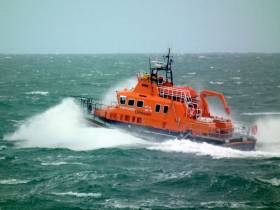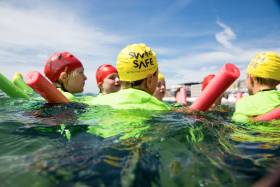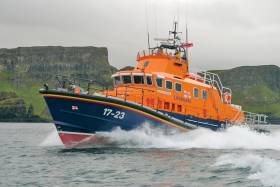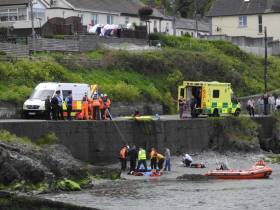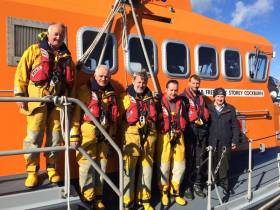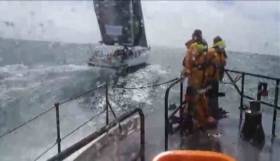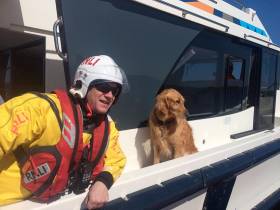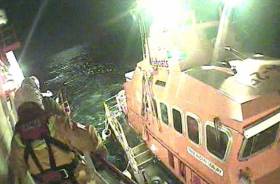Displaying items by tag: RNLI
Lough Derg RNLI Lifeboat launched to assist 2 people after their 26ft–yacht went aground below Coolbawn on Lough Derg
At 8.30pm Saturday, May 27, Valentia Coast Guard requested Lough Derg RNLI Lifeboat to launch to assist 2 people after their 26ft yacht went aground below Coolbawn on the Tipperary shore of Lough Derg.
At 8.40pm, the lifeboat launched with helm Eleanor Hooker, Owen Cavanagh and Delia Ho on board. Winds was north-westerly, Force 4/5. Visibility was good but with dusk imminent.
The lifeboat located the casualty vessel at 8.55pm. Two RNLI volunteers waded in to the casualty vessel, which was on a rocky shoal in 2ft of water. Both passengers were found to be safe and unharmed and wearing their lifejackets. The RNLI volunteers checked the boat and once satisfied that it was not holed, set up bridle and tow. One RNLI crew member remained on board and the other returned to the lifeboat. The vessel was taken gently off the rocks and towed into deep water, where the lifeboat removed the tow and the yacht made way using its outboard motor.
However, after a short period, their outboard motor failed. The lifeboat came alongside and transferred a crew member across, where he helped refuel, prime and vent their fuel tank. The lifeboat remained with the yacht and her crew until she was tied safely alongside at Kilgarvin Harbour.
Liam Maloney, Lifeboat Operations Manager at Lough Derg RNLI Lifeboat, advises boat users to ‘bring charts with you and identify the areas close to shore and islands marked as not navigable’. He commended the crew of the yacht for carrying a spare tank of fuel on board.
The lifeboat returned to station and was ready for service again at 11.00pm.
#RespectTheWater - As temperatures look set to soar across Ireland, new research commissioned by the RNLI reveals that more than a third of Irish people would follow their instincts and fight against the water if they unexpectedly fell into it.
The RNLI’s Respect the Water campaign is asking people to fight those instincts and remember one simple piece of advice – floating – that could save lives from drowning.
Sudden immersion in cold water puts people at severe risk of suffering cold water shock, which triggers the instinctive but life-threatening reaction to gasp uncontrollably and swim hard, which can quickly lead to drowning.
Research commissioned by the RNLI shows 39% of people in Ireland would follow this potentially life-threatening instinct if they fell into water, with 28% of respondents saying their immediate reaction would be to swim, while 3% said they would panic – two of the instinctive responses the RNLI is urging people to fight.
Others said they would remove clothing (5%); do nothing (1%); hold their breath (1%), and 1% said they would not know what to do. Only 8% of respondents knew specifically to float (4%) or tread water (4%).
The RNLI recently announced a partnership with the GAA for the Respect the Water campaign, which is being supported through their Healthy Clubs programme.
The charity invited some of the GAA’s top athletes and healthy club representatives to their training college in Poole and to Portsmouth University to experience the effect of cold water on the body.
One of those who attended was Noel Browne, Castlehaven GAA’s Healthy Clubs representative and well-known long-distance open water swimmer.
Noel has recently returned from swimming from the Gibraltar Straits, a major open water swim which he completed in five hours and 40 minutes.
Backing the RNLI’s Respect the Water campaign, Noel said: “It can go against everything your body wants to do but resisting the urge to fight against the water when you fall in and just float, can save your life.
“I train hard for my swims and spend hours in the water all year round. I’ve seen the effects of cold water shock on people who were not acclimatised to the water and it can be frightening and overwhelming. Fighting against it increases the chances of water entering the lungs and puts a strain on your heart.
“The best course of action is to try to float or rest, just for a short time. The effects of cold water shock will pass within 60 to 90 seconds and let you regain control of your breathing, increasing your chances of survival.
“The recommended floating position is to lean back in the water and keep your airway clear. Keeping calm will help maintain buoyancy and moving as little as possible until you have control of your breathing will give you a much better chance of surviving until you can swim to safety, call for help, or continue to float until help arrives.”
RNLI lifesaving manager Gareth Morrison added: “The RNLI’s volunteer lifeboat crews launch to hundreds of calls for help every year in Ireland but, sadly, not everyone can be reached in time. If people are in danger in the water they can help themselves by floating and regaining control of their breathing.
“Through our Respect the Water campaign in partnership with the GAA, we want to start a national conversation about water safety. We’re asking people to remember this lifesaving advice and share it with others – it could be the difference between life and death. Each year an average of 28 people drown accidentally around the Irish coast.
“For those who are planning to go into the water and with the good weather coming out way, the best way to stay safe is to choose a lifeguarded beach and swim between the flags. And if you see someone in danger in the water, call 999 or 112 and ask for the coastguard.”
The Respect the Water campaign will run throughout the summer on channels including cinema, outdoor, radio, online, and on catch-up TV channels. The cinema adverts are voiced by Irish actor Liam Cunningham.
Visit RNLI.org/RespectTheWater for information on the effects of cold water shock and floating techniques.
Holyhead Lifeboat Launches To Ill Sailor In Irish Sea
#RNLI - Holyhead RNLI’s all-weather lifeboat was launched last evening (Monday 22 May) after a man fell ill on board his sailing boat in the Irish Sea.
The station’s Severn class Christopher Pearce launched at 6.25pm after the man, who was sailing for the port of Holyhead in North Wales, had become ill and made the correct decision to call for help.
Due to the vessel’s location, a large tanker diverted from its course to shelter the stricken craft.
Once the lifeboat arrived minutes later, one volunteer was transferred onto the boat with the lone sailor, who was able to rest while the RNLI crew took his 27ft vessel in tow.
About 20 minutes into the tow, the crew member aboard reported the sailor’s condition was worsening and he was developing chest pains and breathing issues.
The tow was then released and the lifeboat went back alongside to transfer another crew member aboard with more medical equipment.
The casualty’s condition continued to worsen and the need for an immediate evacuation of was needed, so the casualty was transferred to the lifeboat ahead of a medevac by helicopter from HM Coastguard while his boat was brought into Holyhead.
Coxswain Tony Price said: “All at Holyhead RNLI are hoping the man made a swift recovery.”
#Swimming - Northern Ireland will be included for the first time in Swim Safe, a programme offering free outdoor swimming and water safety sessions for children aged 7-14 across the UK.
Swim Safe teaches children how to stay safe when swimming outdoors, which is often more challenging than swimming in a pool.
The programme was created by the RNLI and Swim England, the national governing body for swimming in England.
The free, hour-long Swim Safe sessions are run by qualified swimming teachers and lifeguards, supported by a team of trained volunteers, covering both land-based safety and practical tuition in the water.
Wetsuits, swimming hats and a free goody bag with a t-shirt are all provided. Children must be able to swim at least 25 metres to take part.
Since Swim Safe started in 2013 with just one site in Bude, Cornwall, over 18,000 sessions have taken place across the country – last year over 7,000 children took part in England and Wales.
Now in its fifth year, the programme continues to grow and in 2017, Swim Safe sessions will take place at 20 sites across the UK and Ireland including beaches, lakes, reservoirs and other inland locations.
“Children love swimming outdoors, but swimming in the sea, rivers and lakes is more challenging than swimming in a pool, where most lessons take place,” said Guy Botterill, Swim Safe project manager for the RNLI. “Thanks to Swim Safe, thousands of children will learn how to keep safe when swimming outdoors and know what to do if they get into trouble.”
To book a free Swim Session at Groomsport, near Bangor on Belfast Lough, visit Swimsafe.org.uk — and find out more about the programme via #SwimSafe hashtag and at Facebook.com/SwimSafeOutdoors
#RNLI - Arranmore RNLI's all-weather lifeboat was called out to assist two people in a boat with engine failure off the coast of Glen Head in Co Donegal on Saturday evening (20 May).
The stricken vessel, which had left Bunbeg and was on its way to Sligo, developed engine trouble and was taking in water so dropped anchor off Glen Head until the volunteer lifeboat crew arrived in scene to secure a tow rope and bring to Burtonport, where is now in dry dock for repairs.
Speaking following the callout, Arranmore RNLI coxswain Jimmy Early said the crew did the right thing calling out the lifeboat when they got into difficulty.
“As we approach the summer we would remind anyone heading to sea to always respect the water.
“When going out to sea for pleasure or business, make sure you have adequate fuel, that your boat is in good repair, you wear safety equipment, and have ways of contacting the emergency services.
“Tell someone on shore when you are going out, where you are going and your estimated time of arrival back.”
#RNLI - Wicklow RNLI lifeboat pagers were activated at 12.24pm on Tuesday afternoon (16 May) after a cyclist had fallen from the quayside onto the Strand beach at Wicklow Harbour.
The volunteer inshore lifeboat crew were on scene within minutes and were met by ambulance personnel on the beach, who were assessing the casualty,
Due to the difficult rocky terrain of the beach and the rising tide, the lifeboat crew prepared a stretcher to transport the casualty by boat to the nearby slip.
With the arrival of an Irish Coast Guard cliff rescue unit, it was decided instead to use their specialist climbing equipment to winch the casualty off the beach by stretcher.
Many of the lifeboat crew had also assembled at the Strand and began to assist with the stretcher extraction.
The casualty was lifted from the beach up onto the road, and brought to hospital by a waiting ambulance.
“Our volunteer crew would like to wish the man a speedy recovery from his fall,” said lifeboat press officer Tommy Dover, adding: “This was also the first call out for our new inshore lifeboat Dennis-Audrey, which was officially named earlier this month.”
#RNLI - Courtmacsherry RNLI's all-weather lifeboat was called out at 11.30am yesterday morning (Wednesday 17 May) to go to the aid of a 70ft fishing vessel that sought assistance 10 miles south east of the Old Head of Kinsale in West Cork.
Under coxswain Sean O'Farrell with a crew of six, the lifeboat launched immediately and reached the stricken vessel at 12.15pm.
The fishing boat, with four people on board, had encountered difficulties with its power and other mechanical failure while trawling in the area and required help.
On scene, the volunteer lifeboat crew assessed the difficulties and took the fishing vessel in tow. Both boats arrived back into Kinsale at 4pm.
Conditions at sea were reasonable, with winds in the area blowing Force 3-4 but rising from early afternoon.
Dermot O'Mahony, Courtmacsherry RNLI deputy launching authority, commented after the callout: “We are so pleased that our lifeboat was again fast away today with our ever ready volunteers always available and that the rescue was carried out with skill and precision.”
Rosslare Harbour RNLI all weather was launched by the volunteer lifeboat crew yesterday morningat 11.45am to respond to an EPIRB distress signal (Emergency Position Indicating Radio Beacon).
The Irish Coast Guard alerted Rosslare Harbour RNLI to immediately launch following an EPIRB alarm, which usually indicates a vessel in serious danger. The signal was traced to an 18m yacht close to Carnsore Point off the Wexford coast, which was competing in the offshore Normandy Channel yacht race, as reported by Afloat.ie here.
The RNLI lifeboat and Coast Guard helicopter Rescue 117 were quickly on the scene. It was soon established that the 18m yacht was not in trouble and the EPIRB alarm had accidentally activated. Volunteer RNLI crew aboard Rosslare Harbour lifeboat deactivated the alarm system, returned the device to the yacht which then continued on with its race.
Conditions at the time were reasonably favourable with a brisk southerly wind.
Speaking after the incident Rosslare Harbour RNLI Volunteer Lifeboat Press Officer Jamie Ryan praised the skill of the coxswain who brought the lifeboat alongside the yacht and the efforts of the RNLI volunteers who fixed the EPIRB and returned it to the 18m yacht.
#RNLI - Lough Ree RNLI’s lifeboat crew were alerted by the Irish Coast Guard on Monday morning (8 May) when four people and their dog on board a 40ft motor cruiser ran aground on the Long Shoal near the eastern shore of Lough Ree.
The alarm was raised just after 10.30am and shore crew Tony Diskin, Matt Harte, Billy Henshaw and Denis Buckley responded quickly, reading The Eric Rowse for launch in less than 15 minutes with first responders Denis Begley, Stan Bradbury and Emmet Devereaux on board.
A short time later, the lifeboat crew was alongside the casualty vessel, checking that all on board were uninjured and wearing lifejackets.
Weather conditions the time were dry and sunny, with a Force 3 easterly breeze and a slight swell on the lake.
After checking that the motor cruiser was not taking on water, a tow line was established and the vessel was safely towed to deeper navigable water, from where its proceeded under its own power north towards Lanesboro.
Speaking after the callout, Lough Ree RNLI volunteer Denis Begley reminded cruisers on Lough Ree and other inland navigations to consult their charts regularly for rocky places like the Long Shoal in otherwise deep navigable areas.
Ballycotton RNLI launched in the early hours of this morning (Wednesday 10 May) to assist in the medical evacuation of a fisherman 20 miles south of Ballycotton Lighthouse.
The volunteer lifeboat crew was requested to launch their all-weather lifeboat by the Irish Coast Guard at 12.33am.
The lifeboat under Coxswain Eolan Walsh and with six crew members onboard launched to meet the fishing vessel which had five crew members onboard and was making its way to Ballycotton.
The Irish Coast Guard helicopter Rescue 117 from Waterford was also tasked.
Weather conditions at the time were described as good with a easterly Force 1-2 wind blowing.
Arriving at 1.20am, two lifeboat crew members were immediately put on board the casualty’s vessel where they proceeded to assess the man and administer casualty care.
The man was then transferred onto the lifeboat and brought back to Ballycotton where he was transferred into care of a waiting ambulance crew on the pier.
Speaking following the call out, Ballycotton RNLI Coxswain Eolan Walsh said: ‘We were glad the fishermen, all of whom were wearing lifejackets, were able to raise the alarm when one of their crew members began to feel unwell and required medical assistance. We would like to wish the man a speedy recovery following his ordeal early this morning.
‘As we approach the summer months, we would remind anyone taking to the sea to always carry a means of calling for help or signalling should you need assistance. It is also important to let someone on the shore know when you set sail and when you are due back.’


























